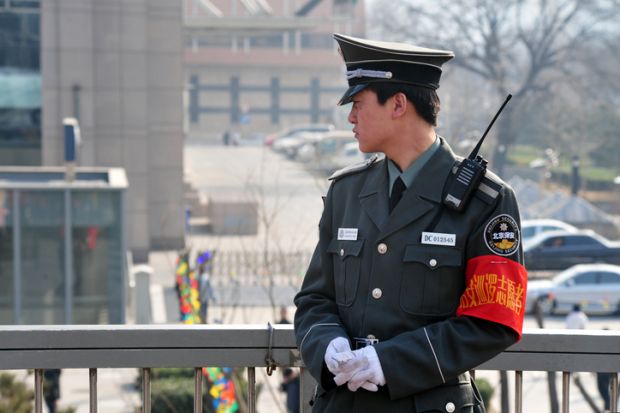The disappearance of an academic has renewed concerns about the safety of scholars specialising in China, as Beijing tightens national security laws.
Hu Shiyun, a professor of Chinese language at Japan’s Kobe Gakuin University, has not been seen since he returned to China, his home country, for a visit last summer. According to local media, neither his family nor the university has heard from him since.
Although relatively little is known about Professor Hu’s disappearance, parallels are being drawn with similar cases, such as that of Yuan Keqin, a Chinese national and former history professor at the Hokkaido University of Education in Japan. The academic was attending a funeral in China in 2019 when he was detained by authorities on suspicion of espionage. The public were still calling for his release as recently as May 2023, when the foreign ministry declined to provide an update.
Similarly, Zhu Jianrong, another Chinese professor working at a Japanese university – in this case specialising in Sino-Japanese relations – was thought to have been detained by authorities on espionage charges in 2013.
Under Xi Jinping, China has strengthened its national security laws, including passing the revised Counter-Espionage Law in 2023, which, according to Eva Seiwert, a researcher at the University of Erlangen-Nuremberg’s Institute for Political Science, “further widens the scope to arrest foreigners, including academics, or their Chinese contacts on espionage charges”.
Beijing’s increasing focus on national security continues to cause “unease” among China-focused academics, she added, with cases like Professor Yuan’s, although “relatively rare”, contributing “to a sense of apprehension”.
And, as China has grown more stringent, the definition of what constitutes a security risk has become “much more expansive”, said Antoine Roth, a researcher on Sino-Japanese relations at Tohoku University. He said Professor Yuan’s case was a “wake-up call” for some academics, as “it was very difficult to fathom that this person was engaged in some sort of spying”.
While China’s national security laws have international implications, Japan is a specific target of the crackdown, according to Dr Roth, in part due to the country’s close relationship with the US, as well as its history as a “place of refuge” for Chinese citizens dissatisfied with the government.
There is a “very long history of Chinese…thinkers that are not aligned with the Chinese state gathering in Japan and sharing their ideas and talking about plans for a new, different vision of China”, he said.
“Any kind of such activity for the CCP today is a very big target of suspicion and…the state under Xi Jinping has become extremely paranoid about this kind of thing.”
This, as well as Japan’s own enhanced national security strategy, “has led some academics to rethink and to have to be more careful in the way they engage, especially in the science and technology field, with their counterparts in China”, said Dr Roth.
Internationally, some scholars are becoming more wary about conducting research on China, with some refraining altogether, according to Dr Seiwert.
Asked about Professor Hu at a press conference, a spokesperson from China’s foreign ministry said they were unaware of the case. “It’s very likely that we won’t get any explanation for many months, if ever,” said Dr Roth.
Register to continue
Why register?
- Registration is free and only takes a moment
- Once registered, you can read 3 articles a month
- Sign up for our newsletter
Subscribe
Or subscribe for unlimited access to:
- Unlimited access to news, views, insights & reviews
- Digital editions
- Digital access to THE’s university and college rankings analysis
Already registered or a current subscriber? Login








